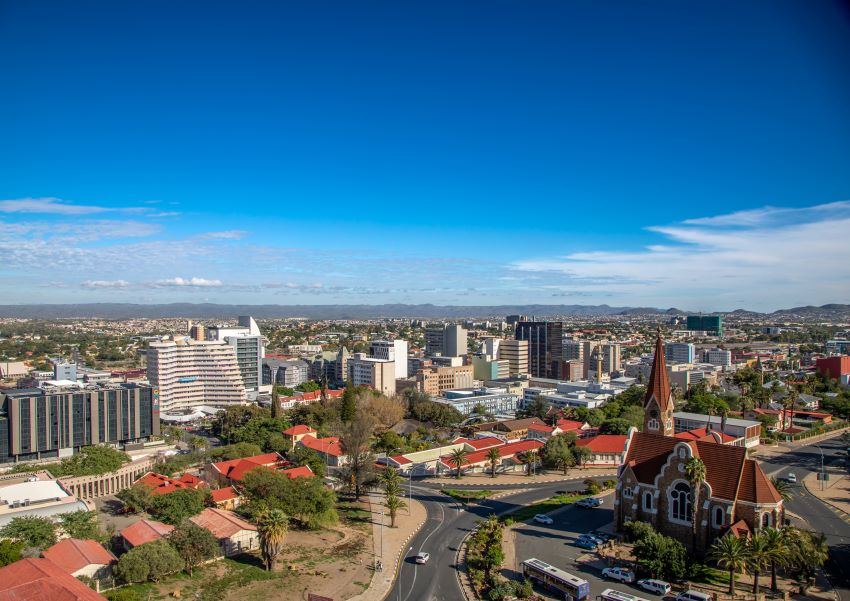Moving to Namibia From US

Get a Free Moving Quote Now!
Start Your International Moving Journey





With the world emerging as a global village, international moving companies are highly in demand. Moving to Namibia from the USA or to any other country isn’t for the faint-hearted people and many people have concluded that an international move isn’t an easy task to be done alone. Along with the strict rules of various countries, unpredictable weather conditions, and other similar challenges, relocating abroad is one of those tasks that will be best handled by international movers.
You can make an international move easier by preparing all the travel-related documents well in advance and keeping them with you at the time of departure. Also, it will be an outstanding idea to hire an international moving company as they will help you pack your belongings in the moving boxes and ensure that you have all the moving-related documents ready with you before the relocation. Moreover, you can seek the help of professionals to buy or rent a house at the new destination and arrange for a storage service before you arrive at the new destination.

About Namibia
Namibia officially called as the Republic of Namibia is a country in southern Africa. Namibia gained its independence from South Africa on 21 March 1990.
Namibia has stable multi-party parliamentary democracy and is a presidential representative democratic republic and all the politics occurs within its framework. Namibia is a membership of international institutions and associations include: United Nations (UN), the Southern African Development Community (SADC), the African Union (AU), and the Commonwealth of Nations.
Namibia is the world’s 34th largest country in the world only after Venezuela. Namibia is also the 2nd least densely populated country in the world only after Mongolia. Namibia shares its borders with Angola, Botswana, South Africa and Zambia.
The economy of Namibia is heavily dependent on extraction of minerals deposits. Mining industry is the primary industry and main source of exports accounting to 8% of GDP and provides 50% income in foreign exchange. Namibia is also the 4th largest producer of Uranium and Namibia also a large producer of zinc. The Namibian coastal deserts are one of the richest sources of diamonds on earth.
Customs Regulations for Namibia
*NOTE: ENTRY REQUIREMENTS DEPEND ON THE COUNTRY OF ORIGIN.
DOCUMENTS REQUIRED TO MOVE TO NAMIBIA

- Passport including photo page
- Original Bill of Lading
- Inventory
- Passport
- Permanent residents permit
CUSTOMS REGULATIONS

- Used household effects are duty free if the client has had them in his possession for more than 12 months. Shipments are not always stopped for customs examination.
- Client must present himself/herself to customs with all documentation. This function can be handled on behalf of the client provided the clearing agent is in possession of the client’s original passport.
PROHIBITED ITEMS

- New items are subject to high taxes and require receipts
- Computers, business equipment and electronics
- Archeological items
- Soil, fruit, vegetables
- One quart of wine is duty-free, more than one quart will incur duty
- 200 cigarettes, 50 cigars, or ½ pound of loose tobacco is duty-free, more than that will incur duty
- Licensed handguns must be declared and a license obtained from the police department upon arrival
MOTOR VEHICLE

VAT is always payable. If stopped for customs examination, the client must be in possession of a permanent resident’s permit if he/she is a new immigrant. Do not ship the auto until the client is in possession of an import permit.
The client must complete all documentation and present it to the customs department together with his/her passport so that customs can attest the CA304a. Customs will only release the vehicle once it is satisfied that everything is in order, and the engine number agrees with that stated on the bill of entry. Once the bill of entry has been endorsed by customs, this document must be presented to the motor license department who will issue the license.
Required documents:
- Import permit
- Passport
- Original Bill of Lading
- Registration papers
- Invoice
FIREARMS

- Are always subject to a customs examination. Firearms will be held by the customs official and kept until the client is in possession of the stamped SAP 311. Required documentation must be presented to his/her local police station who in turn will issue a SAP 312. The police authority will apply for a license on behalf of the importer.
- The firearm will be held at the customs state warehouse. The SAP 311 must be obtained by client’s local police station in South Africa immediately upon his/her arrival in this country.
ALCOHOL

- Alcohol is always subject to customs examination. One bottle each of wine and spirit is extracted from the consignment for testing by the Department of Agriculture to ascertain the percentage of alcohol. Duties are payable based on that percentage.
- The liquor will be kept in bond until notification has been received from the department of agriculture to release.
PETS REGULATIONS

- The veterinary certificate from the country of origin must be presented to customs four (4) working days prior to the animal’s arrival in South Africa. Stamped by state veterinary department.
- Quarantine is not always necessary. It depends upon the state veterinary surgeon. Once the animal has been examined and the surgeon is satisfied with the condition of the animal it will be released.
PLANTS

- Plants and vegetable products require a phytosanitary certificate required from the Department of Agriculture.
NOTE – Customs regulations are subject to change at any time. The proceeding information is a brief summary of customs regulations applicable to household goods shipments to this destination and is being provided for general guidance to assist our Agents and Customers. Since such regulations are subject to change without notice, International sea & air shipping cannot be held liable for any costs, damage, delays, or other detrimental events resulting from non-compliance. Always double check with your local embassy or consulate.
Call our International Moving Specialists @ 1 (866) 315-4170
Moving cost to Namibia
Moving your belongings to Namibia from another country can cost anywhere from $2,000 to $12,000. The exact cost will depend on factors such as the size of the move, the distance to be covered, the transportation method, and current market trends.
Namibia is a country located in the southwest region of Africa. If you are planning to move your possessions from the United States to Namibia and you have a two-bedroom apartment, the cost may range from $4,000 to $10,600. For a four-bedroom house, the cost will be higher.
The cost of shipping your household items to Namibia varies due to various factors that affect shipping expenses. These factors include the distance to be covered and the shipping method used.
To calculate the shipping cost, the moving company takes distance as the primary factor into account. As per the general practice, the farther the destination, the higher will be the cost. For instance, moving household items to Namibia from the United States is more costly than moving them to Argentina because Namibia is farther away from the United States than Argentina.
It’s important to note that the method of transportation chosen by the moving company determines the shipping costs. Different methods of transportation have varying rates due to the resources required. For instance, air transport is the quickest way to move household items, but it’s also the most expensive. On the other hand, shipments by sea are less expensive. It’s essential to keep in mind that different shipping methods have varying shipping times. Therefore, if you need your items to be transported quickly, you’ll have to pay more.
Visa Requirements for moving internationally to Namibia
If you’re planning to move to Namibia for work or to live there for an extended period, you’ll need to apply for a visa or work permit before your departure. While citizens of 49 countries do not require a visa to enter Namibia for tourism or business purposes, those who don’t belong to these countries or are planning to stay for longer than three months will need to apply for a visa or work permit in advance. It’s advisable to apply for one in advance to avoid unnecessary delays, although it’s possible to obtain a tourism or business visa at your port of entry.
When applying for a business or tourism visa, you’ll need a completed application form, a valid passport with three blank pages, a remaining validity of at least six months, two passport photos, and an application fee. For a business visa, you’ll also need to provide a motivation letter stating the nature of the business that will be conducted, a letter of invitation or contact details of your business contacts, and the company’s proof of registration.
When entering the country, you must be able to produce a return ticket or prove that you have adequate funds for the duration of your stay to get you back home or provide proof that you will be supported by a Namibian citizen or permanent resident. It’s important to note that you should submit your visa application at least 60 days before your planned date of departure.
Namibia: Information to know before moving internationally
Also, called the paradise of natural beauty, Namibia is situated in Southwest Africa. It is home to two deserts, famous national parks, and breathtaking coastlines. Expats moving to Namibia are fascinated by the beautiful sceneries like the 120 Km Etosha salt pan, the huge Fish River Canyon, and the infinite dunes in Sossusvlei.
- Namibia comprises 15 regions that are further divided into 121 constituencies.
- Despite being a developing country, Namibia has all the modern amenities and technologies that are usually found in big cities or towns.
- Namibia is one of the sunniest places in the world, still a few parts of this country are prone to draughts and floods.
- If you are searching for a job in Namibia, make sure you possess a qualification that the citizens of this country don’t have.
Popular places for moving internationally to Namibia
Namibia is a country with only one major city of considerable size – Windhoek, the capital city, with a population of around 325,000 people. Other cities like Rundu, Walvis Bay, Swakopmund, and Oshakati also have a significant population, but official statistics on population updates are hard to come by. Windhoek is known as the political, economic, and cultural center of Namibia, and it offers all the amenities of urban life, including different restaurants, museums, clubs, and shopping malls. However, the city is far from being a bustling metropolis and has a European feel due to its historical links with Germany. Windhoek is home to people from various ethnic and cultural backgrounds.
Let’s explore a few important aspects of Namibia, before making your decision on whether to relocate there or not:
Culture and Demography
Moving to a new country can be an exciting adventure, and Namibia is a great destination for those who are looking for natural beauty, cultural diversity, and friendly people. With modern amenities and a growing economy, Namibia is becoming an increasingly popular destination for expats from all over the world. The population is diverse, with a mix of different cultures and tribes, and Christianity is the predominant religion. With proper planning and preparation, moving internationally to Namibia can be a smooth and enjoyable experience.
Language
It’s interesting to note that upon independence, Namibia decided to make English its sole official language, distinguishing itself from South Africa. Nowadays, English is commonly used in government, business, product packaging, and public signs. However, the Afrikaans remain the most widely spoken lingua franca across the country, especially among those who speak different native languages. The younger generation is increasingly fluent in English, and in larger towns like Windhoek, English is commonly spoken. However, if you plan on spending time in rural areas, it’s useful to learn a few phrases in Afrikaans.
